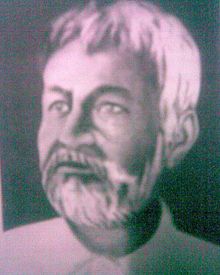Kamalakanta Bhattacharya
Kamalakanta Bhattacharya ( Assamese : কমলাকান্ত ভট্টাচাৰ্য্য , Kamalākānta Bhaṭṭācāryya ; * December 23, 1853 in the village of Barahangi, Darrang district , Assam ; † December 18, 1936 in Guwahati ) was one of the most original Assamese singers, poets and thinkers of his time in the Assamese language.
Life path
Kamalakanta Bhattacharya, who was regarded by contemporaries as " Rishi " ("wise man") because of his prophecies , stands with his poetry for the transition from the Arundai to the Jonaki tradition. In his essays he addressed religious and social problems.
Politically he was strongly nationalistic. He opposed the introduction of Bengali as the official language of Assam in 1871. At the annual meeting of the Indian National Congress in Calcutta in 1886 , he took part as a delegate for Assam. In 1929 he was general secretary of the cultural organization Asam Sahitya Sabha . Throughout his life he held the view that a nation should be based on a religion. He campaigned for the abolition of caste regulations and promoted the education of women.
Works
- Mor Manat Para Katha (autobiography)
- Chintanal ("The Fire of Thoughts", collection of poems 1870)
- Chintataranga ("The Stream of Thought Waves", collection of poems 1933)
- Ashtabakrar Atmajivani
- Ashtabakra (poetry)
Literature and Sources
- Baillie, Laureen (Ed.): Indian Biographical Archives; Munich, ISBN 3-598-34104-0 , Fiche 58
Web links
- Entry on Kamalakanta Bhattacharya in Amaresh Datta: The Encyclopaedia of Indian Literature, Volume 1 , p. 484
Individual evidence
- ↑ Kamalakanta Bhattacharya (short biography) at assams.info, October 20, 2013
| personal data | |
|---|---|
| SURNAME | Bhattacharya, Kamalakanta |
| BRIEF DESCRIPTION | Assamese singer, poet and thinker |
| DATE OF BIRTH | December 23, 1853 |
| PLACE OF BIRTH | Barahangi , Darrang District, Assam |
| DATE OF DEATH | December 18, 1936 |
| Place of death | Guwahati |
